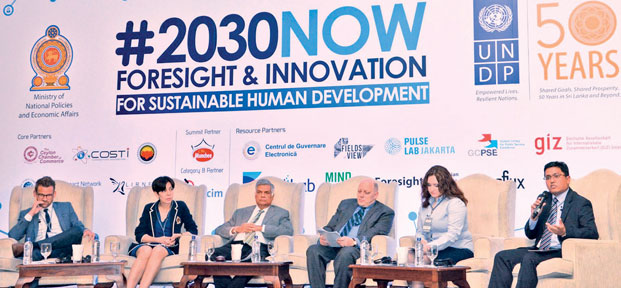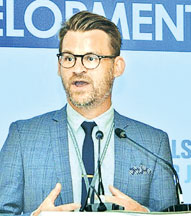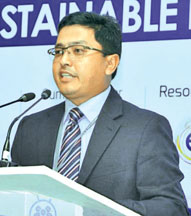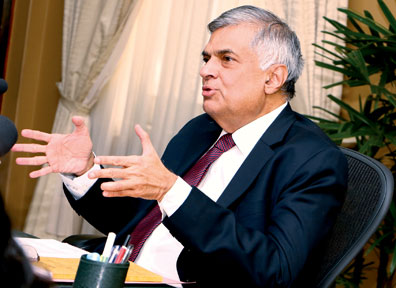Bringing foresight, innovation into public service planning
The National Foresight and Innovation Summit:
 The National Foresight and Innovation Summit last week marked the
beginning of a government initiative to incorporate modern planning
methods to ensure more efficient, policy-making and public service and
make the country better able to predict and cope with surprise events
such as the recent flood and landslide disasters. The National Foresight and Innovation Summit last week marked the
beginning of a government initiative to incorporate modern planning
methods to ensure more efficient, policy-making and public service and
make the country better able to predict and cope with surprise events
such as the recent flood and landslide disasters.
Sri Lanka’s first National Summit on Foresight and Innovation for
Sustainable Human Development brought together key people from
government, business and science from across the island, with a majority
from the State sector whose services to citizens are earmarked for
improvement.
The initiative aims to develop foresight capacity among senior
decision-makers in the government and private sectors as understanding
the future is considered key to effective planning and national
development.
“This summit is particularly relevant in the light of floods and
landslides that Sri Lanka recently experienced,” Resident Representative
of United Nations Development Program (UNDP) Peter Batchelor said.
The UNDP organised the summit with the Ministry of National Policies
and Economic Affairs.
|

Director Mind Lab, Denmark, Thomas Prehn |
|

Director of myForesight, Rushadi Abdul Rahim |
“Sri Lanka is at a crossroads with huge expectations of a better
future which requires patience and a lot of hard work to build,” he
said.
Standard approaches to development can only capture part of the story
and the time of business as usual and using the past to predict the
future is clearly over, Batchelor told the summit’s opening session.
 Foresight is a powerful tool to visualise the future with the
initiative, championed by Prime Minister Ranil Wickremesinghe himself,
aiming to use foresight and innovation concepts to build institutions
and the next generation workforce. Foresight is a powerful tool to visualise the future with the
initiative, championed by Prime Minister Ranil Wickremesinghe himself,
aiming to use foresight and innovation concepts to build institutions
and the next generation workforce.
The summit contributed to enhancing development practices and
policies, to create the world Sri Lankans want and need by 2030 by
fostering a development sector that is forward-thinking and visionary,
the UNDP said.
Sri Lankans want prosperity and to catch up on the 30-years lost
owing to the ethnic war, Prime Minister Wickremesinghe told the summit’s
high-level plenary themed ‘Reimagining Governance: An Opportunity for
Sri Lanka’.
“We have to utilise our human resources and policy of human
development, which, combined with our location will help us innovate as
a nation.”
Premier Wickremesinghe said Sri Lanka is well positioned right next
to the major shipping route across the Indian Ocean which is surrounded
by some of the world’s biggest markets and fastest growing economies.
“We have always been a small island in the Indian Ocean which was for
a long time one of the richest trading regions in the world and will
become one of the fastest growing regions in word in the next 30-40
years.”
Director of myForesight of the Foresight Institute of the government
of Malaysia, Rushadi Abdul Rahim said initiatives of this nature need
‘champions’ to take them forward. “Sri Lanka is on the right track, by
having the Prime Minister attend Sri Lanka’s first national summit on
foresight and innovation - a champion is important to undertake any
process of envisioning for a country,” he said.Sri Lanka should look at
what the country wants to be by 2030, today, since understanding the
future allows it to anticipate opportunities, risks and threats, Abdul
Rahim said. State Minister for National Policies and Economic Affairs,
Niroshan Perera said the government hopes to set up a laboratory on
policy development in collaboration with the UNDP.
The lab will develop improved public services which can be tested
before implementation. The summit brought together many international
resource people including those from Mind Lab - Denmark, Open Design
City, Germany, Superflux - UK, myForesight – Malaysia, Fields of View -
India, the UNDP Centre for Public Service Excellence - Singapore, the UN
Pulse Lab - Jakarta, UNDP Kolba Lab – Armenia, UNDP MiLab – Moldova, and
eGov Centre – Moldova.
|
What is foresight?
Foresight is looking at the future in a systematic way and the
technique is well established and recognised throughout the world today
as an effective policy planning tool, used by both advanced economies
and multinational companies.
For the technique – considered a strategic planning methodology - to
work, foresight capacity and stakeholder organisations must be linked
with senior policy makers, as that helps in getting recommendations
implemented. The method is used to provide alerts about threats, complex
situations and organisational vulnerabilities, allowing time to adapt.
Lacking foresight can prove costly to government and corporate
investments.
According to the UNDP, through these methodologies, organisations
seek to create coherent policy frameworks that will effectively utilise
limited resources. Therefore, understanding emerging trends and
opportunities while successfully evading inevitable challenges is key,
it said.
Studies say the science of ‘Strategic Foresight’ was pioneered in the
1930s but it took another four decades before the technique entered
mainstream and even then was mainly used by Western militaries for
planning exercises.
New look public sector
Director Mind Lab, Denmark, Thomas Prehn considered a pioneer in
using foresighting and innovation to improve public service, said the
key is the change of mindset, with decision-makers needing to think of
alternative futures. “It is about new ways of working for the public
sector, which is used to administration and regulation,” he said. “The
public service must shift from administration and regulation to being a
service provider and an enabler.”
If public service institutions are not ready for innovation, trying
out new things in a ‘lab’ could be a good thing, Prehn said. That is how
Denmark’s Mind Lab works, developing prototypes and testing them on a
small scale before implementing new ways of work nationally.
“For the lab to work, you need people with the right mindset, with
original thinking and passion.” |
|

